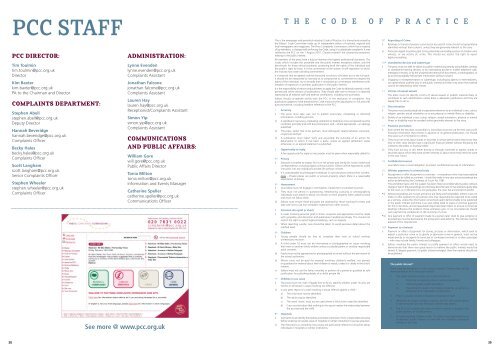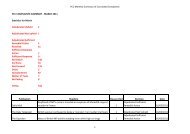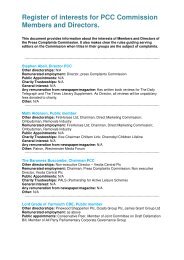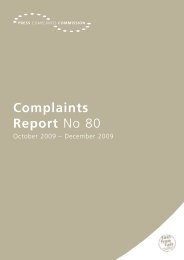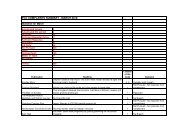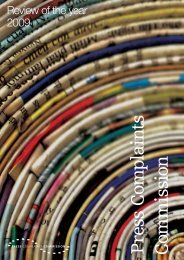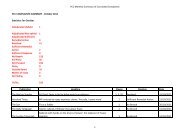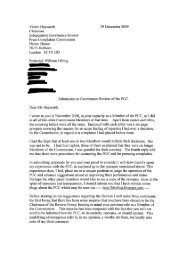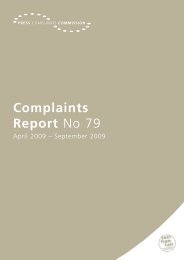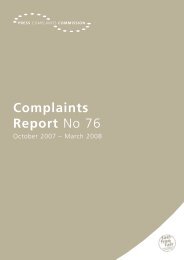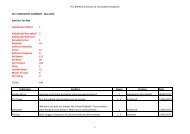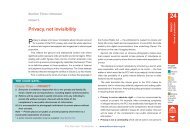2008 - Press Complaints Commission
2008 - Press Complaints Commission
2008 - Press Complaints Commission
Create successful ePaper yourself
Turn your PDF publications into a flip-book with our unique Google optimized e-Paper software.
PCC STAFF<br />
T H E C O D E O F P R A C T I C E<br />
PCC DIRECTOR:<br />
Tim Toulmin<br />
tim.toulmin@pcc.org.uk<br />
Director<br />
Kim Baxter<br />
kim.baxter@pcc.org.uk<br />
PA to the Chairman and Director<br />
COMPLAINTS DEPARTMENT:<br />
Stephen Abell<br />
stephen.abell@pcc.org.uk<br />
Deputy Director<br />
Hannah Beveridge<br />
hannah.beveridge@pcc.org.uk<br />
<strong>Complaints</strong> Officer<br />
Becky Hales<br />
becky.hales@pcc.org.uk<br />
<strong>Complaints</strong> Officer<br />
Scott Langham<br />
scott.langham@pcc.org.uk<br />
Senior <strong>Complaints</strong> Officer<br />
Stephen Wheeler<br />
stephen.wheeler@pcc.org.uk<br />
<strong>Complaints</strong> Officer<br />
ADMINISTRATION:<br />
Lynne Evenden<br />
lynne.evenden@pcc.org.uk<br />
<strong>Complaints</strong> Assistant<br />
Jonathan Falcone<br />
jonathan.falcone@pcc.org.uk<br />
<strong>Complaints</strong> Assistant<br />
Lauren Hay<br />
lauren.hay@pcc.org.uk<br />
Receptionist/<strong>Complaints</strong> Assistant<br />
Simon Yip<br />
simon.yip@pcc.org.uk<br />
<strong>Complaints</strong> Assistant<br />
COMMUNICATIONS<br />
AND PUBLIC AFFAIRS:<br />
William Gore<br />
will.gore@pcc.org.uk<br />
Public Affairs Director<br />
Tonia Milton<br />
tonia.milton@pcc.org.uk<br />
Information and Events Manager<br />
Catherine Speller<br />
catherine.speller@pcc.org.uk<br />
Communications Officer<br />
See more @ www.pcc.org.uk<br />
This is the newspaper and periodical industry’s Code of Practice. It is framed and revised by<br />
the Editors’ Code Committee made up of independent editors of national, regional and<br />
local newspapers and magazines. The <strong>Press</strong> <strong>Complaints</strong> <strong>Commission</strong>, which has a majority<br />
of lay members, is charged with enforcing the Code, using it to adjudicate complaints. It was<br />
ratified by the PCC on the 1 August 2007. Clauses marked* are covered by exceptions<br />
relating to the public interest.<br />
All members of the press have a duty to maintain the highest professional standards. The<br />
Code, which includes this preamble and the public interest exceptions below, sets the<br />
benchmark for those ethical standards, protecting both the rights of the individual and<br />
the public's right to know. It is the cornerstone of the system of self-regulation to which<br />
the industry has made a binding commitment.<br />
It is essential that an agreed code be honoured not only to the letter but in the full spirit.<br />
It should not be interpreted so narrowly as to compromise its commitment to respect the<br />
rights of the individual, nor so broadly that it constitutes an unnecessary interference with<br />
freedom of expression or prevents publication in the public interest.<br />
It is the responsibility of editors and publishers to apply the Code to editorial material in both<br />
printed and online versions of publications. They should take care to ensure it is observed<br />
rigorously by all editorial staff and external contributors, including non-journalists.<br />
Editors should co-operate swiftly with the PCC in the resolution of complaints. Any<br />
publication judged to have breached the Code must print the adjudication in full and with<br />
due prominence, including headline reference to the PCC.<br />
1 Accuracy<br />
i) The press must take care not to publish inaccurate, misleading or distorted<br />
information, including pictures.<br />
ii) A significant inaccuracy, misleading statement or distortion once recognised must be<br />
corrected, promptly and with due prominence, and – where appropriate – an apology<br />
published.<br />
iii) The press, whilst free to be partisan, must distinguish clearly between comment,<br />
conjecture and fact.<br />
iv) A publication must report fairly and accurately the outcome of an action for<br />
defamation to which it has been a party, unless an agreed settlement states<br />
otherwise, or an agreed statement is published.<br />
2 Opportunity to reply<br />
A fair opportunity for reply to inaccuracies must be given when reasonably called for.<br />
3* Privacy<br />
i) Everyone is entitled to respect for his or her private and family life, home, health and<br />
correspondence, including digital communications. Editors will be expected to justify<br />
intrusions into any individual's private life without consent.<br />
ii) It is unacceptable to photograph individuals in a private place without their consent.<br />
Note – Private places are public or private property where there is a reasonable<br />
expectation of privacy.<br />
4* Harassment<br />
i) Journalists must not engage in intimidation, harassment or persistent pursuit.<br />
ii) They must not persist in questioning, telephoning, pursuing or photographing<br />
individuals once asked to desist; nor remain on their property when asked to leave<br />
and must not follow them.<br />
iii) Editors must ensure these principles are observed by those working for them and<br />
take care not to use non-compliant material from other sources.<br />
5 Intrusion into grief or shock<br />
i) In cases involving personal grief or shock, enquiries and approaches must be made<br />
with sympathy and discretion and publication handled sensitively. This should not<br />
restrict the right to report legal proceedings, such as inquests.<br />
ii) When reporting suicide, care should be taken to avoid excessive detail about the<br />
method used.<br />
6* Children<br />
i) Young people should be free to complete their time at school without<br />
unnecessary intrusion.<br />
ii) A child under 16 must not be interviewed or photographed on issues involving<br />
their own or another child’s welfare unless a custodial parent or similarly responsible<br />
adult consents.<br />
iii) Pupils must not be approached or photographed at school without the permission of<br />
the school authorities.<br />
iv) Minors must not be paid for material involving children’s welfare, nor parents<br />
or guardians for material about their children or wards, unless it is clearly in the child's<br />
interest.<br />
v) Editors must not use the fame, notoriety or position of a parent or guardian as sole<br />
justification for publishing details of a child’s private life.<br />
7* Children in sex cases<br />
i) The press must not, even if legally free to do so, identify children under 16 who are<br />
victims or witnesses in cases involving sex offences.<br />
ii) In any press report of a case involving a sexual offence against a child –<br />
a) The child must not be identified.<br />
b) The adult may be identified.<br />
c) The word ‘incest’ must not be used where a child victim might be identified.<br />
d) Care must be taken that nothing in the report implies the relationship between<br />
the accused and the child.<br />
8* Hospitals<br />
i) Journalists must identify themselves and obtain permission from a responsible executive<br />
before entering non-public areas of hospitals or similar institutions to pursue enquiries.<br />
ii) The restrictions on intruding into privacy are particularly relevant to enquiries about<br />
individuals in hospitals or similar institutions.<br />
9* Reporting of Crime<br />
i) Relatives or friends of persons convicted or accused of crime should not generally be<br />
identified without their consent, unless they are genuinely relevant to the story.<br />
ii) Particular regard should be paid to the potentially vulnerable position of children who<br />
witness, or are victims of, crime. This should not restrict the right to report<br />
legal proceedings.<br />
10* Clandestine devices and subterfuge<br />
i) The press must not seek to obtain or publish material acquired by using hidden cameras<br />
or clandestine listening devices; or by intercepting private or mobile telephone calls,<br />
messages or emails; or by the unauthorised removal of documents, or photographs; or<br />
by accessing digitally-held private information without consent.<br />
ii) Engaging in misrepresentation or subterfuge, including by agents or intermediaries,<br />
can generally be justified only in the public interest and then only when the material<br />
cannot be obtained by other means.<br />
11 Victims of sexual assault<br />
The press must not identify victims of sexual assault or publish material likely to<br />
contribute to such identification unless there is adequate justification and they are<br />
legally free to do so.<br />
12 Discrimination<br />
i) The press must avoid prejudicial or pejorative reference to an individual's race, colour,<br />
religion, gender, sexual orientation or to any physical or mental illness or disability.<br />
ii) Details of an individual's race, colour, religion, sexual orientation, physical or mental<br />
illness or disability must be avoided unless genuinely relevant to the story.<br />
13 Financial journalism<br />
i) Even where the law does not prohibit it, journalists must not use for their own profit<br />
financial information they receive in advance of its general publication, nor should<br />
they pass such information to others.<br />
ii) They must not write about shares or securities in whose performance they know that<br />
they or their close families have a significant financial interest without disclosing the<br />
interest to the editor or financial editor.<br />
iii) They must not buy or sell, either directly or through nominees or agents, shares or<br />
securities about which they have written recently or about which they intend to write<br />
in the near future.<br />
14 Confidential sources<br />
Journalists have a moral obligation to protect confidential sources of information.<br />
15 Witness payments in criminal trials<br />
i) No payment or offer of payment to a witness – or any person who may reasonably be<br />
expected to be called as a witness – should be made in any case once proceedings are<br />
active as defined by the Contempt of Court Act 1981.<br />
This prohibition lasts until the suspect has been freed unconditionally by police without<br />
charge or bail or the proceedings are otherwise discontinued; or has entered a guilty plea<br />
to the court; or, in the event of a not guilty plea, the court has announced its verdict.<br />
*ii) Where proceedings are not yet active but are likely and foreseeable, editors must not<br />
make or offer payment to any person who may reasonably be expected to be called<br />
as a witness, unless the information concerned ought demonstrably to be published<br />
in the public interest and there is an over-riding need to make or promise payment<br />
for this to be done; and all reasonable steps have been taken to ensure no financial<br />
dealings influence the evidence those witnesses give. In no circumstances should<br />
such payment be conditional on the outcome of a trial.<br />
*iii) Any payment or offer of payment made to a person later cited to give evidence in<br />
proceedings must be disclosed to the prosecution and defence. The witness must be<br />
advised of this requirement.<br />
16* Payment to criminals<br />
i) Payment or offers of payment for stories, pictures or information, which seek to<br />
exploit a particular crime or to glorify or glamorise crime in general, must not be<br />
made directly or via agents to convicted or confessed criminals or to their associates<br />
– who may include family, friends and colleagues.<br />
ii) Editors invoking the public interest to justify payment or offers would need to<br />
demonstrate that there was good reason to believe the public interest would be<br />
served. If, despite payment, no public interest emerged, then the material should not<br />
be published.<br />
The public interest*<br />
There may be exceptions to the clauses marked *where they can be<br />
demonstrated to be in the public interest.<br />
1. The public interest includes, but is not confined to:<br />
i) Detecting or exposing crime or serious impropriety.<br />
ii) Protecting public health and safety.<br />
iii) Preventing the public from being misled by an action or<br />
statement of an individual or organisation.<br />
2. There is a public interest in freedom of expression itself.<br />
3. Whenever the public interest is invoked, the PCC will require editors<br />
to demonstrate fully how the public interest was served.<br />
4. The PCC will consider the extent to which material is already in the<br />
public domain, or will become so.<br />
5. In cases involving children under 16, editors must demonstrate an<br />
exceptional public interest to over-ride the normally paramount<br />
interest of the child.<br />
38 39


